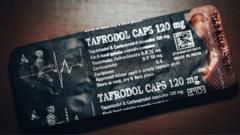In a major crackdown on opioid misuse, India has banned the manufacturing and export of two highly addictive medications, tapentadol and carisoprodol, following a BBC investigation exposing their role in a public health crisis across West Africa. The Drugs Controller General, Dr. Rajeev Singh Raghuvanshi, cited concerns over drug abuse and its detrimental effects on populations, leading to the immediate ban of any combination involving these substances. A Mumbai-based firm, Aveo Pharmaceuticals, was discovered to be illegally exporting these opioids to countries like Ghana and Nigeria. Despite their severe health risks, including respiratory failures and potential overdose deaths, these drugs are inexpensive and sought after in West Africa. Additionally, the investigation featured undercover footage revealing Aveo executives acknowledging the dangerous nature of these products while promoting their sale to vulnerable populations. Following the ban, Indian authorities raided the company's facilities, confiscating their entire stock, and are prepared to pursue legal actions against any entities associated with illicit activities involving these drugs.
India Takes Action Against Opioid Crisis Fueling West Africa's Health Emergency

India Takes Action Against Opioid Crisis Fueling West Africa's Health Emergency
In a bold move to tackle the opioid crisis, India bans two addictive drugs linked to public health issues in West Africa.
Indian authorities have cracked down on the illegal export of dangerous opioids, marking a decisive step towards combating the growing health crisis in West African nations triggered by these drugs.
In a major crackdown on opioid misuse, India has banned the manufacturing and export of two highly addictive medications, tapentadol and carisoprodol, following a BBC investigation exposing their role in a public health crisis across West Africa. The Drugs Controller General, Dr. Rajeev Singh Raghuvanshi, cited concerns over drug abuse and its detrimental effects on populations, leading to the immediate ban of any combination involving these substances. A Mumbai-based firm, Aveo Pharmaceuticals, was discovered to be illegally exporting these opioids to countries like Ghana and Nigeria. Despite their severe health risks, including respiratory failures and potential overdose deaths, these drugs are inexpensive and sought after in West Africa. Additionally, the investigation featured undercover footage revealing Aveo executives acknowledging the dangerous nature of these products while promoting their sale to vulnerable populations. Following the ban, Indian authorities raided the company's facilities, confiscating their entire stock, and are prepared to pursue legal actions against any entities associated with illicit activities involving these drugs.




















